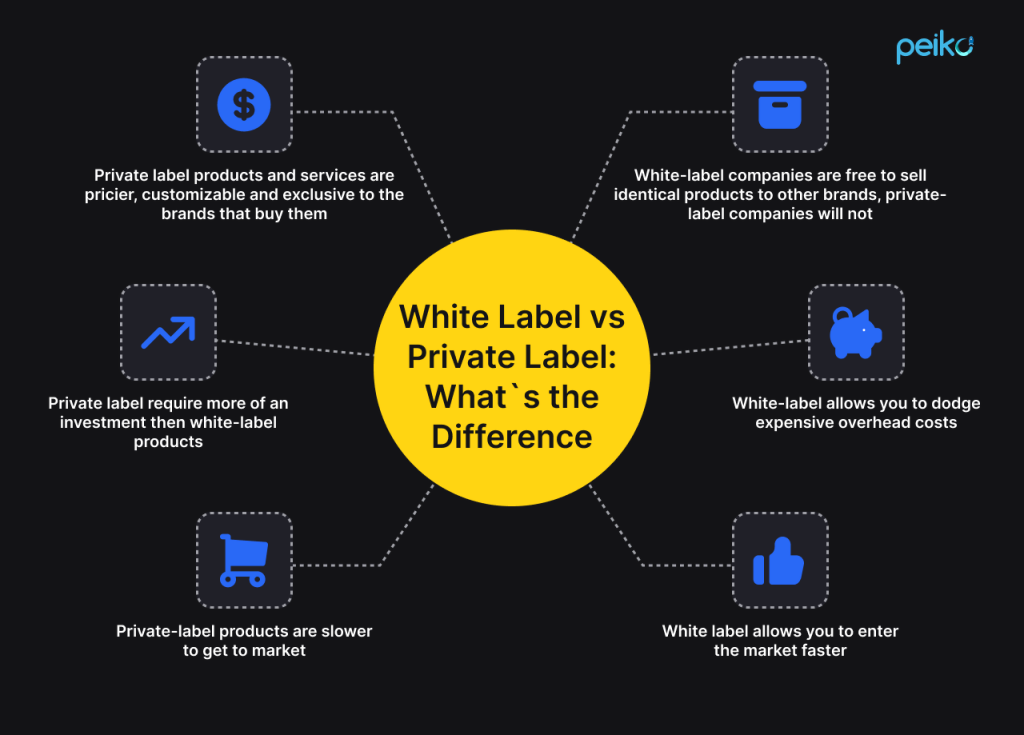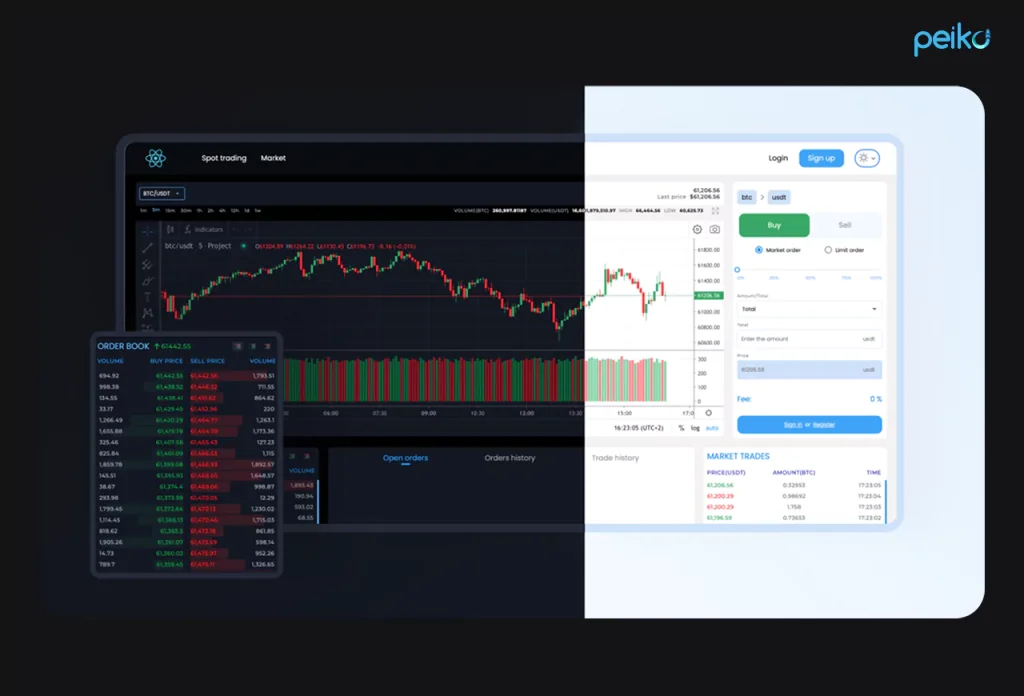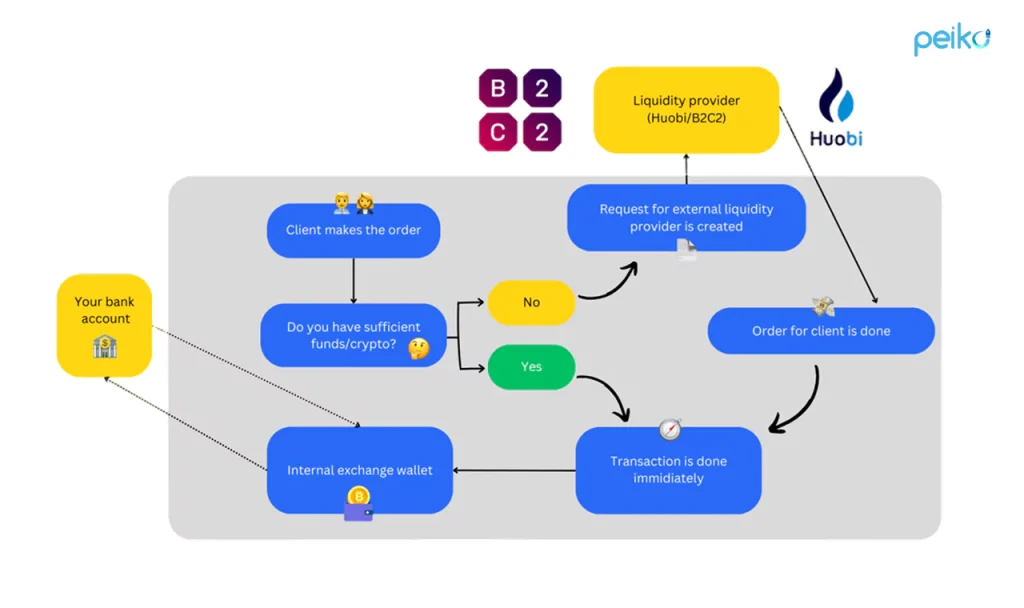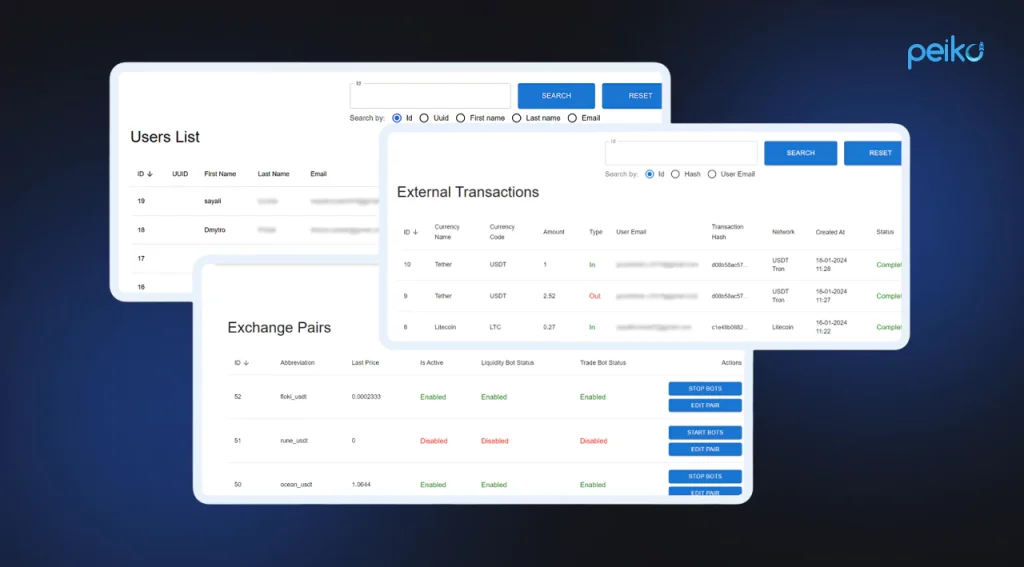People are always looking for a streamlined way of starting their crypto exchanges with little work. Two standard solutions are private label and white label solutions.
Before making a decision you should compare white label versus private label. By choosing white-label solutions, you get a ready-made platform that can be adapted to your needs, including customization of the design and some functions while maintaining the overall structure.
In turn, private label solutions allow the business to have full control over the design, functionality, and specifications of the product. Yes, this gives more freedom but requires more effort and resources for customization.
So, which one wins in the comparison – private label versus white label? Let’s discover more details on how these solutions differ and which one to select.
Defining white labeling
White labeling cryptocurrency exchanges involves using a pre-existing platform provided by a third-party supplier that can be rebranded and simply tailored to meet the business needs. The product already includes all the fundamental elements, such as trading engines, wallets, and payment integration.
Companies can personalize the look and branding (e.g., logos, colors), but the underlying software remains unchanged. White label solutions are best for those who want a fast go-to-market solution with low development outlays.
Advantages of white-label crypto exchanges
Let’s reveal the main benefits of white label solutions. Why are they so popular instead of development from scratch?
Quicker market presence. White-label crypto exchanges allow businesses to swiftly launch their platforms without the long and time-consuming process of obtaining a custom solution. Pre-made platforms give businesses the power to go live within weeks, leading to a head start in the fast-changing crypto market.
Cost-effective. Building a crypto exchange from scratch is time and money-intensive. White-label options provide a more affordable solution by reducing development expenditure, enabling companies to direct their capital towards other vital sectors like marketing, liquidity, and retaining customers.
Trusted, proven technology. White-label exchanges possess tried-and-tested, secure, and scalable technology that has already undergone testing by its provider. This minimizes the risk of launching a new exchange, providing firms with a sound platform to launch straight away.
Who is it for?
- Startups or entrepreneurs who are ready to quickly deploy a crypto exchange.
- Those who want market entry with low development costs.
- Companies focused on user experience and brand identity.
Defining private labeling
Private labeling meaning for crypto exchanges that you get a fully customizable platform in which you are fully in charge of all the elements of the exchange. This method allows businesses to personalize the design, functionality, and technical specifications of the exchange based on their exact needs.
Whatever the custom features, integrations, or custom user interfaces, private labeling provides full freedom for your company. It is typically the choice for those businesses with the means and capability to build an entirely customized exchange experience.
Benefits of private label crypto exchanges
What are three main advantages of private label solution for cryptocurrency exchnages? Here are they:
- Complete customization. Private-label crypto exchanges allow businesses full autonomy over all aspects of the platform, from the interface to functionality. With that level of customization, businesses are able to build a tailored user experience that most suits their brand and market needs.
- Complete branding control. With private-label solutions, businesses own complete control over their platform’s branding, user interface, and pricing models. This provides an opportunity to create a highly tailored exchange that is coherent with the company’s vision and strategy.
- Scalability for future growth. For businesses anticipating aggressive expansion or with specific needs, private-label exchanges provide greater scalability. Companies are able to easily convert and scale the infrastructure of the platform for growth, and hence, it is a good choice for large organizations or businesses that need considerable flexibility.
Who should select it?
- Current businesses with the means to build a fully customized exchange.
- Businesses needing a unique platform with custom features to stand out in the marketplace.
- Organizations that desire total control of the security, design, and functionality of the platform.

Our white-label solution includes the benefits of both private label and white label solutions, offering businesses full control over branding and features and comes at an affordable price.
Core differences: Private label vs white label
So, software private label or white label solutions? Choosing the right platform model to host your cryptocurrency exchange can make a huge difference in the success of your business strategy. Below, we explained the key differences between the two models:
Customization flexibility
White label. This choice offers pre-configured platforms with the ability to customize somewhat. You can usually customize things like logos, color schemes, and basic design elements. But the underlying functionality is the same for every business using the solution, so you won’t have extensive control over features or back-end operations. It is one of the main white label private label difference.
Private label. The software is where the level of customization is at its maximum. In this case, you’re provided with full freedom over the functionality, design, and technical aspects of the exchange. It means you can tailor the platform to meet your business’s unique needs, provide customized experiences for users, and include custom features.
Level of control
White label. In this case, the infrastructure and software below belong to the platform provider. While you can make cosmetic adjustments like branding and some functional tweaks, most of the system is handled by the provider, including updates, security, and maintenance.
Private label. You get full control of the platform’s architecture. Everything from the user interface to the back-end layout can be defined by you on how it all works. This option gives the full liberty to customize, maintain, and revolutionize your exchange platform in whatever form you choose, without depending on a third party.
Time to market
White label. The greatest advantage of a white label solution is how quickly you can deploy your exchange. Since the platform is already built and operational, you can skip the development stage and go straight to branding and deployment. This is an ideal option for businesses that must enter the crypto arena quickly and start serving users.
Private label. Alternatively, private label solutions require more time to develop. Since the platform is being developed from scratch, it will take months, depending on the level of customization you need. This longer timeframe enables you to build a very specific exchange but at the cost of slower entry into the marketplace.
Cost implications
White label. Comparing white labeling vs private labeling, white label solutions are cheaper. As the platform is already created and the provider is reselling it to multiple customers, the cost is shared. Your only expenses to incur are branding, minor customizations, and operational setup.
Private label. Such solutions are significantly more expensive. The reason lies in the custom development, which takes specialized technical teams, designers, and more resources to bring your vision to life. The cost is justified by the highly customized platform and outright ownership of its functionality.
Comparison table: Difference between white label and private label
You can see a comparison table where we summarize the core differences between these two types of solutions.
| Feature | White label | Private label |
| Customization | Limited (mainly branding and basic design changes) | Full (complete control over features and functionality) |
| Control | Shared control (provider manages platform) | Full control (business controls all aspects) |
| Time to market | Fast (platform is ready for branding and launch) | Slow (custom development and design required) |
| Cost | Lower (pre-built solution, minimal customization) | Higher (custom development and features) |
| Technical resources | Minimal (provider handles maintenance and updates) | High (requires in-house or third-party development) |
| Platform ownership | Shared (provider owns the platform) | Full ownership (business owns and controls the platform) |
| Maintenance | Managed by the provider | Managed by the business or technical team |
Choosing the right model for your business
Between the white label or private label cryptocurrency exchange platform lies a decision influenced by a series of factors depending on your objectives, available means, and timeline. It is important to understand white label private label difference to make the best choice for your exchange.
Select white label if:
- You require swift, low-budget entry into cryptocurrency.
- Your expertise is branding and marketing, not creating a platform from scratch.
- You lack technical resources or capital to create an in-house bespoke exchange.
- You need a turnkey solution with minimal adjustments that can be quickly deployed.
- You don’t want to be encumbered by the intricacies of platform maintenance and updates.
Pick private label if:
- You have a large budget and need to create a fully customized cryptocurrency exchange.
- You want total control over the user experience, functionality, and technology of your platform.
- Your firm has the resources (or can outsource) to manage ongoing development, maintenance, and expansion.
- You are keen on building a very differentiated product that will stand out in the market with unique features.
- You are prepared to spend time in a longer development process to build a fully customized exchange platform.
Comparing private labeling vs white labeling, white label solutions are optimal for individuals who want to develop crypto exchanges rapidly with minimal technical hassle. Select private label solutions if you have unique requirements and desire to develop a platform for your specific needs.
Weigh your company’s resources, goals, and timeline to decide which model – software private label or white label solutions – is most appropriate to your plan.
Start crypto exchange with us and enjoy the ready solution in 3 weeks
At Peiko, we provide a world-class white-label crypto exchange solution that can have your professional exchange live in as little as 3 weeks. This solution has you generating revenue earlier with a solid, secure, and fully customized CEX (centralized exchange) platform that stands out in today’s competitive environment.
Our white-label crypto exchange solution offers you a flexible, scalable, and secure platform, allowing you to focus on brand building and user acquisition while we deal with the technical complexities. Through our innovative technology, you can give your clients a seamless trading experience from day one.
Advanced features of our white-label crypto exchange
1. Complete trading functionality with TradingView integration
Our exchange platform has everything your users need for successful trading. From spot to market orders with instant execution, in crypto, every millisecond counts. The OrderBook matching engine ensures quick order execution, and the TradingView charts integration allows users to analyze market trends in real-time and make smart choices.

2. High performance with microservice architecture
Our platform is powered by a sophisticated microservice architecture that enables the exchange to handle 10,000 transactions per second. This highly scalable framework places your platform in the same league as leading exchanges, so it’s simple for you to keep up with your increasing number of users. With autoscaling, your platform scales to increasing demand while optimizing server usage and minimizing expenses.
3. Deep liquidity for seamless trading
To ensure a seamless user experience, we’ve pooled liquidity from top providers Huobi and B2C2. This enables deep liquidity, which translates to faster order execution. Should additional liquidity be needed, additional providers can be added with ease, so your platform remains competitive and efficient.

4. Streamlined admin panel for effortless administration
Running a crypto exchange is not just about creating the platform, but an issue of control and management. Our user-friendly admin panel allows you to manage users, set commission rates, and monitor platform activity in real-time. With a secure, no-access feature to funds, you can be in full control of your platform while keeping users’ information protected.

5. Quick setup & affordable pricing
With Peiko’s white-label solution, you can have your exchange operational in as little as 3 weeks a fraction of the time it would require to create a platform from scratch. And our one-stop solution comes in at 5-6 times lower cost than bespoke-built exchanges. That means significant savings for you. You also get full rights to the setup code, making customization further down the line that much easier.
Additional features:
- Improved OrderBook matching for a better user experience.
- Trading Bots and liquidity enhancements for better market performance.
- Zero commissions for users on the exchange, similar to Binance.
- Fast pair addition — add new trading pairs in 2-4 minutes.
- Fireblocks Custody for top-tier security.
- Safe sign-in/sign-up with 2FA for an additional layer of protection.
- KYC Integration using SumSub for regulatory compliance.
- Bespoke code for future scaling and expansion.
- Integration with Azure, AWS, and Google Cloud.
- Blockchain fee pre-check before withdrawals for transparency.
- User cabinet for convenient account management.
Don’t wait to get into the booming crypto startup space. Let’s begin the process of launching your exchange using the most secure, efficient, and affordable white-label solution on the market.
Conclusion
Now, you have all the information to decide between private vs white label solutions. Both white label and private label products have their own target audience. White label products are ideal for entrepreneurs who want a quick and easy way to rebrand an already developed and tested product. Private label products give you full control over the branding, design, and even the functionality of the product. The final choice depends on your goals, your time, and your budget.
If you are interested in entering the crypto arena and need a fast, customized solution, Peiko’s white label crypto exchange platform is exactly what you need.
Contact us today and get a functional crypto exchange in the shortest time!
FAQ
Businesses choose white label products when they need to quickly bring products to market. Some common examples include SaaS platforms such as email marketing software, CRM software, and e-commerce platforms. Tech products such as mobile apps or website templates are typical white label products.
In software development, private label solutions are custom-made solutions, like crypto exchanges, created by one company but labeled and sold by another. The purchaser can customize the look and features of the software, but the original programmer takes care of the backend and technical work.
Sure. White label meaning you can customize your cryptocurrency exchange solution to a certain extent. The basic functionality is pre-installed, but you can customize the branding, look and feel, and add some features to suit specific requirements.
Private labeling offers a lot of control over the product’s appearance and features, but it requires large upfront investments to undertake product development, and an expensive final quality assurance phase. Private labeling can delay your entry into the market.
It lies in the level of customization and ownership. White label solutions are already built and ready to deploy. But you can custmoize some features. Private label products allow for greater control over the functionality of the product, but you need more time to launch your project.









